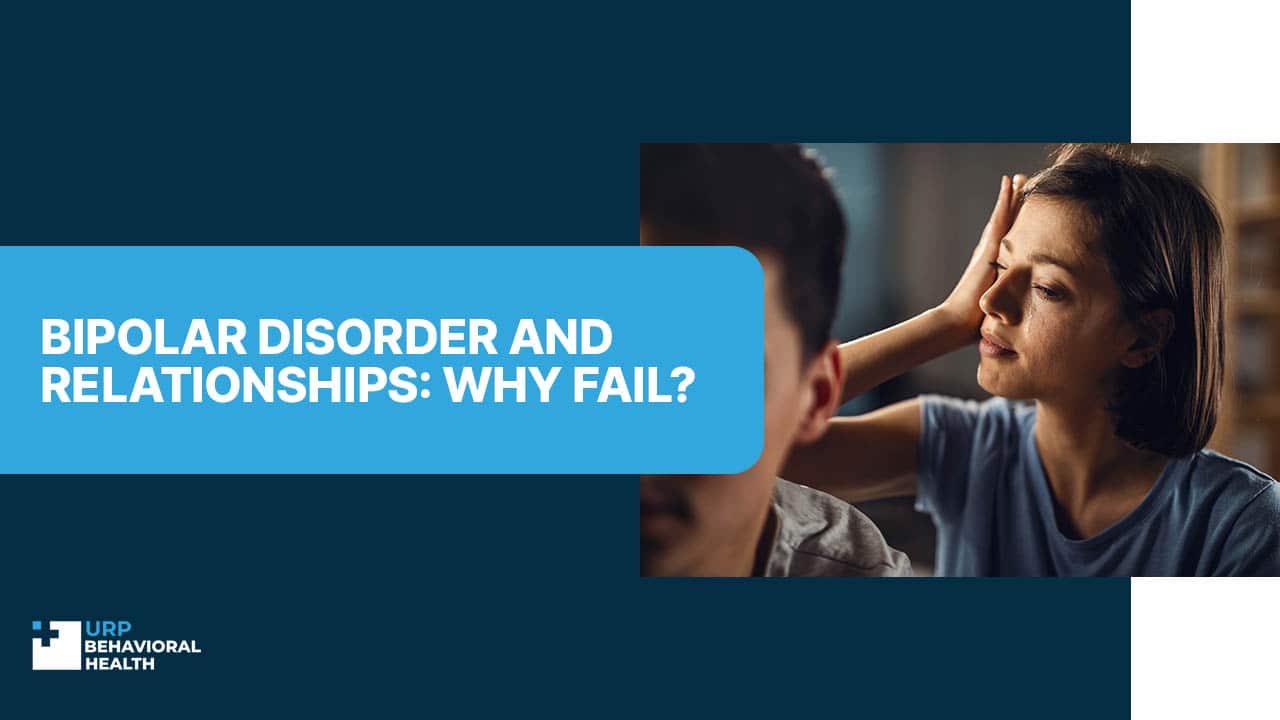
Bipolar Disorder and Relationships: Why Fail?
Do you know that bipolar disorder keeps the palm among all mental health issues in the number of broken relationships and divorces? The study says that the possibility of separation or divorce in a couple with one of the partners having BD is 2-3 times higher than on average [1].
If you have ever faced a bipolar person, you can clearly understand why it is so. Bipolar disorder is quite a complex mental issue, one of the behavioral disorders, and the correlation between bipolar disorder and relationships is strong. Although the whole section of BD is divided into three main subtypes, namely, bipolar disorder 1, bipolar disorder 2, and cyclothymic disorder, all of them impact the relationships, making them complex, tangled, and often co-dependent.
Let’s learn how it is to be bipolar in relationships, and how it feels when your partner has BD in the URP Behavioral Health blog.
Understanding Bipolar Disorder in Relationships: How Mental Illness Manifests in Couples
What features of BD impact the relationships?
- Constant balancing between two controversial conditions: hypomania/mania and depression. That is, during a hypomanic or manic episode, a person feels excited, and self-confident, and experiences bad sleep and obsessive thoughts, while during the depressive episode, the same person feels devastated, indifferent or anxious, low-energized and expresses negative emotions about life, themselves, and their partner. Sometimes, shifts between these cycles are sudden so you can be overwhelmed with their rapidity.
- Depending on the type of BD, the course of the relationship may vary. For example, bipolar 2 disorder and relationships with a partner can successfully co-exist as this type of BD features at least one hypomanic/major depressive episode with prolonged neutral periods. For the situation with bipolar 1 and relationships, it is quite natural when a diseased partner falls into mania and wants a partner to follow their delusional ideas. Yet, these episodes can be shifted with neutral ones if treated, and during these periods, the relationships may seem almost healthy [2].
In every case, there are high chances of facing a person with bipolar disorder sabotaging relationships. Although they typically don’t have any intention to sabotage them.
We’ll help you understand your options and guide you toward care.
How Bipolar Disorder Affects Relationships
If you ask does bipolar disorder affect relationships, the answer is clear. It does, and it impacts relationships in multiple ways.
- Sexual life. Often, BD persons have sexual problems, and their shifting episodes make them either highly desire sex or fully indifferent to it. Besides, due to low self-esteem in BD persons, low sex drive is often detected.
- Social integration issues that impact relationships. Typically, a couple supports one another and contributes to the well-being of one another. With a BD partner, you feel uncertainty as their shifting episodes often lead to troubles with social integration and communication, and thus, problems with job seeking and higher risks of unemployment which results in family budget failures [3].
- Equality of partners is also imbalanced in such relationships. Due to higher needs in support, approval, and care, a BD partner often requires another partner to sacrifice themselves in their favor. Thus, a partner of a BD person leaks leisure time, hobby, and time for self-care and all their efforts are aimed at maintaining the needs of a partner.
- Parenting can be triggering for a BD person, while the behavior of such a parent during manic/hypomanic episodes may be scary and traumatic for children.
As a result, even the healthiest and the most optimistic partner of a BD person at last understands that bipolar and relationships are hard to co-integrate.
How a Person With Bipolar Thinks in Relationships
Now let’s look from another side. How does it look from the point of view of a BD person? Typically, bipolar persons have no intention to build unhealthy relationships, yet their understanding of what healthy relationships are is often perverse due to altered mood states. That is, they seek more attention during manic periods ,while they can produce negative emotions about a partner while being depressed.
Common Reasons Bipolar Relationships Fail
So, why do bipolar relationships tend to fail?
- Lack of empathy and awareness of BD in a partner. If you do not understand what happens to your loved one with BD, you think they do things for a purpose while they don’t.
- Emotional and physical devastation of a normotypic partner is another reason to finish a relationship with a bipolar person.
- Low accessibility of bipolar treatment or unwillingness of a partner to undergo diagnostics and relevant treatment. It is especially common in bipolar 1 disorder patients during their manic phase.
Bipolar Disorder Symptoms in Relationships
At last, which signs of bipolar disorder in relationships should be alarm bells for you?
- You notice that your partner feels exaggerated, provides you with delusive ideas and encourages you to follow them. Sometimes, BD partners during their hypomanic or manic episodes lack sleep, feel a constant sex drive and remain hyperactive. Then the episode shifts, and a person falls into depression.
- Often, a BD person cannot recall what he/she did during their manic episode. These memory lacunas are also signs of bipolar disorder.
- You notice that your partner almost ‘eats’ your time and requires more and more effort from you to make them happy.
- You know that your partner’s family member has bipolar disorder or depressive disorder (up to 90% of BD persons have their diagnosis inherited).
Reach out today and let us create a treatment plan designed around your needs.
Treatment Options for a Bipolar Partner to Save Relationships
When you know for sure that your loved partner has bipolar disorder, and this mental issue spoils your relationship, is there a way out? Of course, there is a solution to save bipolar relationships and protect your mental health from their negative impact. Let’s learn simple rules for a neurotypical person engaged in relationships with a bipolar person.
- Put your self-care first. Often, living with a bipolar person leads to mental health issues in a partner so taking care of yourself is essential. These self-care routines include physical exercising, talking to friends in case of relationship issues, practicing some hobbies, and practicing meditation or mindfulness.
- Learn more about bipolar disorder to understand the feelings your bipolar partner experiences at the moment.
- Never stop communicating your feelings. Although living with a bipolar partner is like riding a high-speed rollercoaster, when you speak about your feelings and you are open to listening to your partner’s feelings spoken to you, it brings relief and mutual understanding.
- Look for professional support. Often, high levels of anxiety and depressive episodes are devastating for a bipolar person. If you persuade a partner to start the therapy, their mitigation may help you both to maintain balance in your relationship.
- Avoid triggers. The shifts between hypomanic and depressive episodes in bipolar disorder are often triggered by some events, so detecting triggers and avoiding them is a good strategy.
Bottom Line
It is not a secret that bipolar people in relationships can be nasty and hard to understand. It happens due to mood swings and regular switching between mania/hypomania and depressive episodes that form the whole mental concept of a bipolar person. One day you live with a caring and protective person but the other day your partner can turn into a neglecting and cold person, and still, they remain the same person. That’s why scientists claim bipolar disorder to be among the most prone to divorce mental disorders. Yet, if you or your spouse have bipolar disorder, it is not a final verdict for your relationship. If you know the diagnosis, you know what to expect and how to preserve your love. The first and foremost thing a person engaged in a relationship with a bipolar person can do is to focus on self-care to avoid self-sacrificing and then, with the help of professional support and your strive to save the relationship, you can build a strategy which may help reduce acute manifestations of bipolar disorder in your partner and ease your life with them. We welcome couples suffering from bipolar manifestations in their relationship to get professional help in URP Behavioral Health. Our rehabilitation center provides evidence-based bipolar treatment plans for both men and women with the disorder, their family members and partners in the form of individual and group therapy, outpatient and inpatient plans, medicine management and their combinations customized to meet individual needs and cases.
Don’t wait - confidential help is available right now for you or your loved one.
Resources:
- https://www.mdpi.com/1648-9144/57/8/771
- https://www.psychiatry.org/patients-families/bipolar-disorders/what-are-bipolar-disorders#:~:text=Bipolar%20disorder%20is%20a%20category,with%20bipolar%20disorder%20or%20depression.
- https://www.ncbi.nlm.nih.gov/pmc/articles/PMC9005072/
















